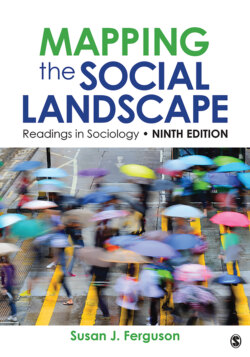Читать книгу Mapping the Social Landscape - Группа авторов - Страница 7
На сайте Литреса книга снята с продажи.
Preface
ОглавлениеAs the title suggests, Mapping the Social Landscape is about exploration and discovery. It means taking a closer look at a complex, ever-changing social world in which locations, pathways, and boundaries are not fixed. Because sociology describes and explains our social surroundings, it enables us to understand this shifting landscape. Thus, sociology is about discovering society and discovering ourselves. The purpose of this anthology is to introduce the discipline of sociology and to convey the excitement and the challenge of the sociological enterprise.
Although a number of readers in introductory sociology are already available for students, I have yet to find one that exposes students to the broad diversity of scholarship, perspectives, and authorship that exists within the field of sociology. This diversity goes beyond recognizing gender, racial-ethnic, and social class differences to acknowledging a plurality of voices and views within the discipline. Like other anthologies, this one includes classic works by authors such as Karl Marx, Max Weber, C. Wright Mills, Kingsley Davis, Philip Zimbardo, and Wilbert Moore; in addition, however, I have drawn from a wide range of contemporary scholarship, some of which provides newer treatments of traditional concepts. This diversity of viewpoints and approaches should encourage students to evaluate and analyze the sociological ideas and research findings presented.
In addition, because I find it invaluable in my own teaching to use examples from personal experiences to enable students to see the connection between “private troubles and public issues,” as C. Wright Mills phrased it, I have included in this collection a few personal narratives to help students comprehend how social forces affect individual lives. Thus, this anthology includes classic as well as contemporary writings, and the voices of other social scientists who render provocative sociological insights. The readings also exemplify functionalist, conflict, and symbolic interactionist perspectives and different types of research methodology. Each article is preceded by a brief headnote that sets the context within which the reader can seek to understand the sociological work. Thus, the selections communicate an enthusiasm for sociology while illustrating sociological concepts, theories, and methods.
During the past 30 years, sociology has benefited from a rich abundance of creative scholarship, but many of these original works have not been adequately presented in textbooks or readers. I believe an introductory anthology needs to reflect the new questions concerning research and theory within the discipline. Moreover, I find that students enjoy reading the actual words and research of sociologists. This anthology, therefore, includes many cutting-edge pieces of sociological scholarship and some very recent publications by recognized social analysts. Current issues are examined, including childhood school cliques, tourism in Hawaii, working at McDonald’s, the effects of globalization, racism in the United States, socialization in law school, race and home ownership, elite college admissions, health care, poverty, sexual assault on college campuses, working in a slaughterhouse, military boot camps, teen suicide, sex trafficking, prison riots, and Superstorm Sandy. In essence, I have attempted not to break new ground but, rather, to compile a collection that provides a fresh, innovative look at the discipline of sociology.
